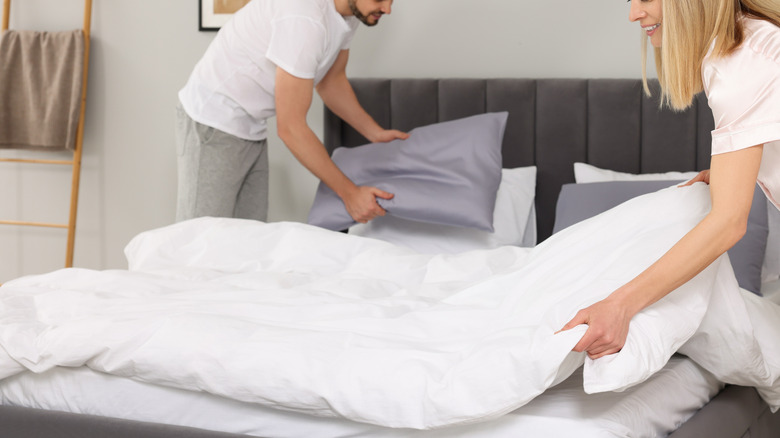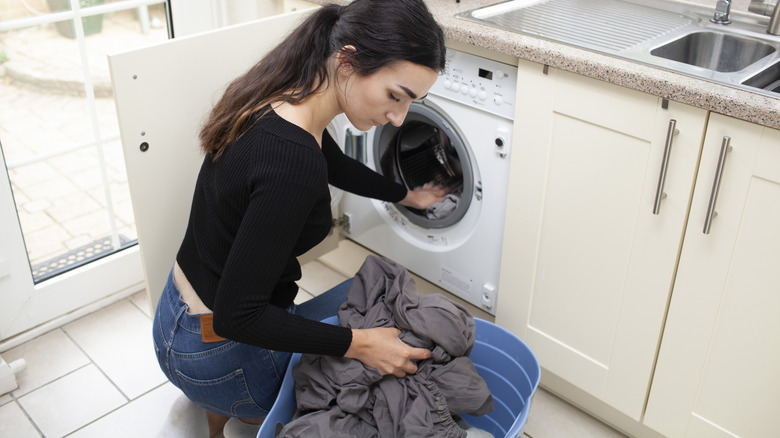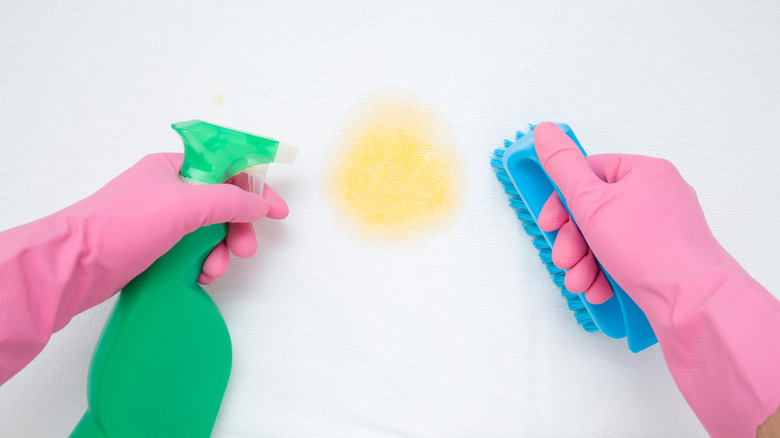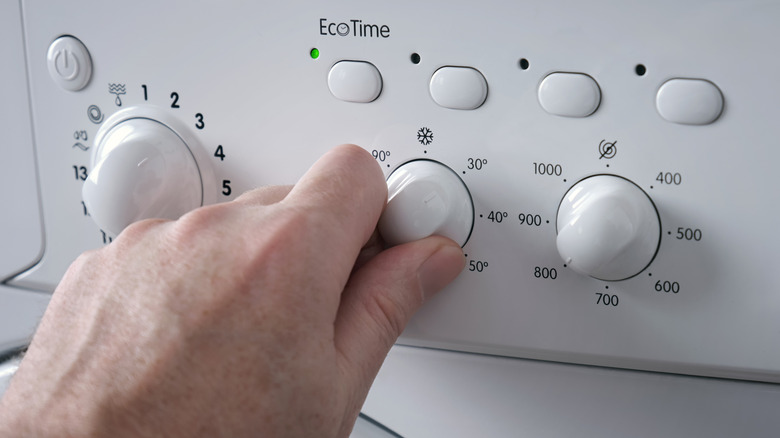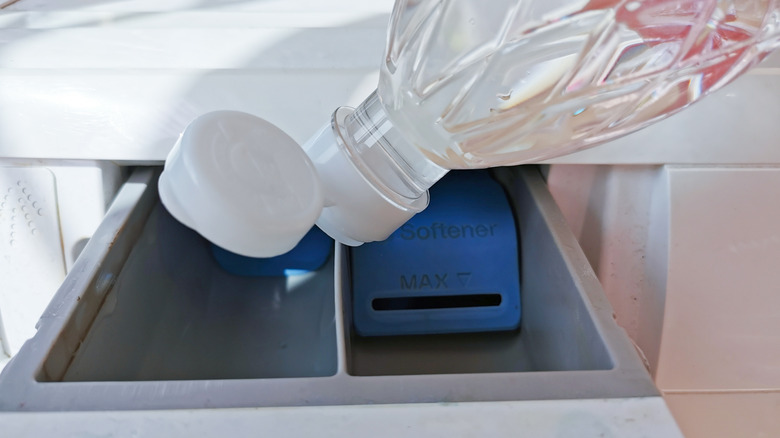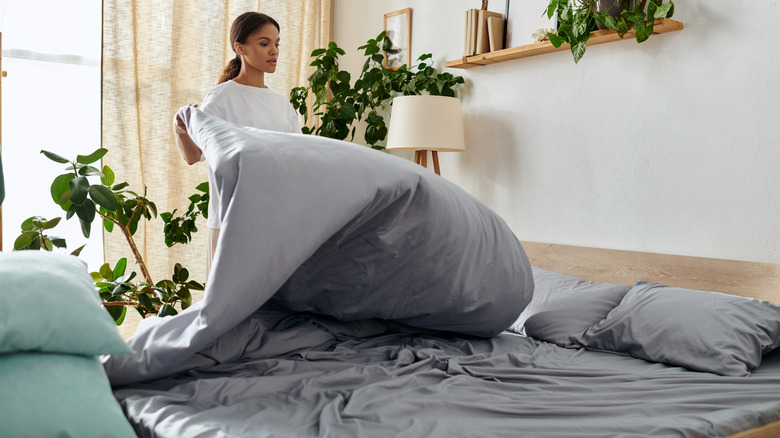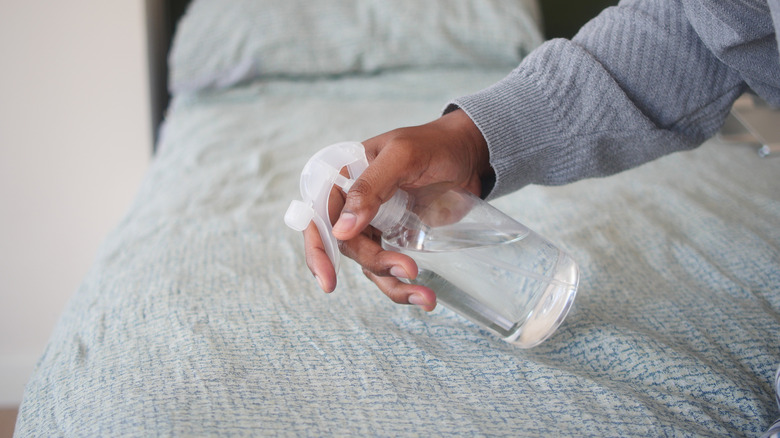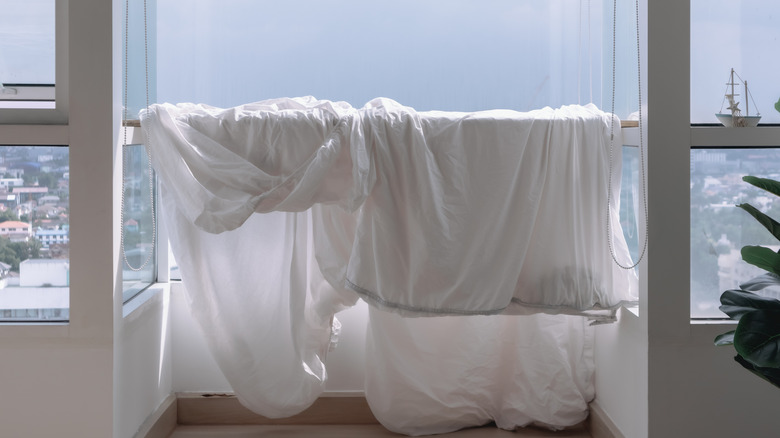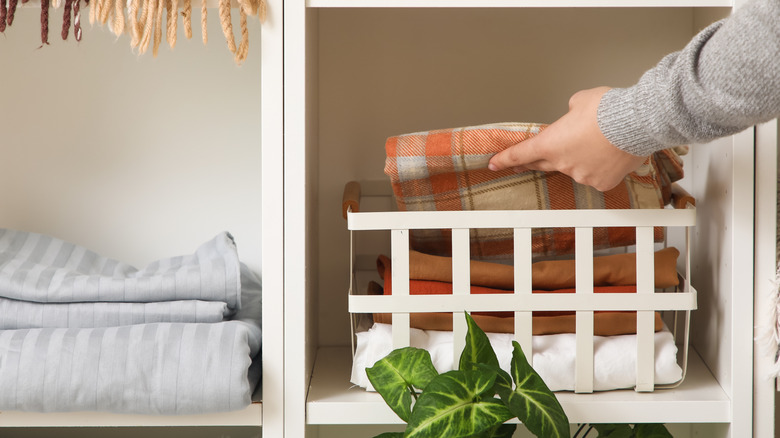The Biggest Secrets To Keeping Your Bedding Fresh & Clean
We may receive a commission on purchases made from links.
Maintaining clean and fresh bedding might seem like a never-ending journey, but it's easier than you think if you know a few secret tips. And you're in luck, because we're here to dish on those secrets. Simply follow a few best practices and you'll be all set. For instance, sticking to a wash schedule, using the appropriate amount of detergent, and treating pesky stains promptly as they occur will have a huge impact.
The way you dry and store your sheets will also influence their freshness. Wondering how to keep your sheets and covers habitable between washes? Avoid making your bed every morning (yes, really!) and spritzing your linens with fragrant sprays. Moreover, encouraging your pets to sleep in their bed more often will prevent your linens from getting dirty or smelly. Ready to enjoy hotel-level cleanliness at your home? If so, here are the easiest ways to keep your bedding fresh and clean.
Wash your bedding at regular intervals to keep it clean and fresh
You should wash your bedding at regular intervals. This will prevent your sweat and body oils from accumulating and turning your linens yellow. Moreover, even dead skin cells your body naturally sheds will compromise their cleanliness. Your moisturizer, hair products, and saliva (if you drool) will also build up over time and stain your sheets and pillowcases. These won't just affect the freshness of your bedding, but also make it harder for you to clean the items the more yellow and stained they become.
So, how often do you need to clean your sheets? Wash them weekly to keep them fresh and clean. In case that's not possible and you don't sweat a lot, put them in the washer twice monthly. That being said, you should clean them more often if someone is sick, as whatever their body is shedding will contain those pathogens. As for your pillowcases, wash them every week, regardless of when you clean the rest of your bedding — these receive the brunt of the oils, bacteria, and saliva. Though, changing your sheets and pillow covers together avoids fresh ones from coming into contact with your dirty bedding. Additionally, wash your blanket, duvet, or comforter's cover every month. If you're using a mattress pad or protector, cleanse it every one to two months.
Treat stains immediately to keep your bedding fresh between washes
Accidentally spilling some wine or dropping a few fries on the bedding might be another Tuesday for you, but if you don't want the stains to set in permanently, spot treat them at once. Besides, certain messes, like food or drink-based ones, will even give off a bad odor. So, don't wait until laundry day and instead attend to it immediately. Use a clean microfiber cloth (or paper towel or cotton ball) to soak up the mess. In case the stain has dried, dampen the cloth (choose a white one to avoid color bleeding) with water and dab the stain. Avoid rubbing it in, or it'll make matters worse.
Once you deal with the excess, use a pre-treatment spray to break down the stain and eliminate it. Grandma's Secret Spot Remover is a good option. Alternatively, apply a little liquid detergent or dish soap on a damp cloth and use it to blot oily stains — the surfactants in the soap help dissolve the grease. This will also work well on makeup- and crayon-based stains. Just don't use dish soap or detergents to clean coffee, juice, or tea, since it'll cause the tannin-based stains to set in. Protein stains, like the ones caused by egg, milk, blood, urine, or meat, will benefit from a cold water treatment, because it'll prevent them from baking in. In case you can still see the spots, use hydrogen peroxide — its oxidizing properties break down the pigmented chemical structures in the organic matter. You can try rubbing alcohol for stubborn stains, as it is a solvent and will attack the stain at a molecular level. Additionally, bleach will be best for ink or dye stains, because it'll transform them into colorless particles that are soluble and able to be removed. But use it only on your white or colorfast linens, as it can discolor dark fabrics.
Select the right temperature to wash your bed sheets
Simply washing your sheets weekly isn't enough. You must choose the right temperature to ensure they come out pristine and unharmed. To elaborate, accidentally picking a too hot cycle might make your sheets look worn. Conversely, cold water won't whiten them. So, should you use hot or cold water to wash your bedding?
Check your sheet's care label and choose a setting accordingly. In case you can't find one, pick a temperature based on your needs. Hot water is ideal for killing bacteria and getting rid of allergy-triggering dust mites. It's also best for tackling stubborn stains and body oils in your sheets. That being said, hot water can also wear a fabric faster, lead to color fading and shrinkage. So, use it only for white or light-colored fabrics and materials like cotton or polyester blends. On the other hand, a cold cycle will be gentle on the delicate fabrics like satin, bamboo, and silk. Plus, it won't cause wear and tear or shrinkage. It won't even bleed dark colors or fade vibrant patterns. Better yet, it consumes less energy, so it's better for the environment. Alas, it doesn't get rid of bacteria and other nasties.
Want the best of both worlds? Choose a warm temperature cycle instead. It's ideal for common bed sheet materials, like cotton, linen, polyester blends, and flannel. Moreover, it can tackle germs and stains without damaging the fabric. Better yet, it's compatible with cleaning agents like borax and stain removers like OxiClean, that require a little heat to fully dissolve and tackle the stain.
Be conscious of the amount of detergent you add, or your sheets will feel greasy or dirty
Do your washed sheets sticky or waxy to the touch? Or, maybe, they look dirty and smell bad? If you're dealing with the former, chances are you're adding too much detergent to your washer. This will also make your linens feel rough and wear more quickly. In case you're dealing with dirt and odor, you're likely using too little detergent, making it difficult to break down the sweat, body oil, and dirt buildup. So, be deliberate about the amount of detergent you add to each load.
As a rule of thumb, use about 2 tablespoon of detergent for a medium-sized load of laundry (which comes out to about 6 pounds). For reference, bed sheet sets weigh on average anywhere from 2 to 4 pounds, but could be more depending on the material (take, for example, flannel sheets). However, the amount of laundry detergent you actually need per load will depend on a few factors. For starters, you'll need to add more soap to the machine if your linens are incredibly dirty or you're washing a large load. This will ensure the nasties aren't deposited back to your laundry. Similarly, hard water compromises a cleanser's effectiveness, so you'll need to add a little extra to each load to counteract the mineral deposits. Your washing machine type matters, too. Top-loaders require relatively more water than front-loading models. Consequently, they can require more detergent.
Remove yellow and gray stains from your white sheets using household ingredients
Yellow or gray stains can diminish the beauty of your sheets and make them feel dirty (even if you washed them recently). While hard water deposits are the most likely culprit behind the gray spots, your linens can assume a yellow cast due to various reasons. The most common being regular use. Your sweat, body oils, and dead skin will build up over time and cause yellowing and stains. Moreover, if you use too much detergent or don't rinse it out well, the residue can lead your bedding to assume a yellow tint. The good news is you can get rid of these stains using household ingredients, like lemon, vinegar, baking soda, or hydrogen peroxide.
Lemon juice's citric acid will act as a bleach to break down the stains and leave your sheets smelling fresh. Just squeeze the juice of one to your washer along with detergent. Or, combine 1 gallon of hot water with ½ cup of lemon juice and soak your bedding (except silk) for an hour prior to laundering it. Alternatively, try out a vinegar and baking soda combo. The acetic acid in vinegar, which has disinfecting properties, will combine with sodium bicarbonate to cause a chemical reaction that helps dissolve the stains and whiten your sheets. Start by pouring ½ cup of baking soda into your washer's drum. Then, add 1/2 cup vinegar to the fabric softener dispenser and run a regular cycle. In case either method doesn't completely whiten your white sheets, add 1 cup of a natural bleaching agent like 3% hydrogen peroxide to the drum — it'll oxidize the stain and help break it down. You can also use a bluing agent, like Mrs. Stewart's Concentrated Liquid, according to the manufacturer's instructions. Avoid using bleach, since it can damage the fabric if you use too much or it doesn't get dissolved properly. It may also react with the sweat and body oils on your sheets and further yellow them.
Air your bedding on a daily basis to minimize odors
A free and simple way to keep your bedding fresh and clean is to air it out. The increased air circulation will take care of any lingering moisture and eliminate resultant odors, in addition to getting rid of microscopic dust mites, as these little pests thrive in moisture-rich environments. Plus, fresh-smelling sheets will enhance your sleep quality, as evidenced by the National Sleep Foundation's bedroom poll. So, avoid making your bed as soon as you wake up and peel back your duvet for a few hours to air out your sheets on a daily or weekly basis.
Start by opening the doors and windows in your room. The antibacterial properties of the UV rays from the sunlight will do away with the lingering germs, while the air will help the moisture evaporate. That being said, don't place your bedding directly under the sun's blazing rays for long, or their colors might fade. During bad weather, turn on the fan to improve ventilation. While peeling back your comforters will give your sheets sufficient breathing room, shake them out every week to fluff them up and dislodge stuck debris and hidden dust mites. Plump your pillows (sans their covers), too, to let moisture evaporate. Finally, as discussed above, aim for a fresh set of sheets weekly.
Use a linen spray to ensure your bedding smells pleasant
Another way to keep your bedding fresh between washes is to use a linen spray. It'll immediately get rid of the odor caused by sweat and moisture buildup, ensuring your sheets smell heavenly every day. However, keep in mind that this is a temporary solution. This is because it'll merely mask the bad scent and won't get rid of the underlying issue.
Invest in a pleasant-smelling linen spray, like Caldrea's Linen and Room Spray Air Freshener that's formaldehyde and paraben-free. Or, give your bedding a much-needed refresh with an all-natural solution. Just fill a spray bottle with 1 cup of distilled water and about 20 to 30 drops of your favorite essential oil. Ensure the oils you choose are colorless, or your white sheets could stain. Finally, add 3 ounces of witch hazel, which will help the essential oils to evenly combine with the water. Shake the bottle well and your linen spray will be ready for use. However, exercise caution when spritzing your DIY spray. Although essential oils are derived from natural ingredients, they might still give off VOCs (volatile organic compounds) if super concentrated, which can be harmful to people with respiratory illnesses. In case you'd rather not risk it, sprinkle a little baking soda on your bed sheets, giving it about an hour to absorb the excess moisture and neutralize odors before vacuuming it. The reason this works is because sodium bicarbonate is alkaline and will neutralize acidic odors — when it changes the stain's pH, it changes the smell.
Encourage your pets to sleep in their own bed or bathe them to keep your bedding dirt-free
A 2022 survey conducted by the American Academy of Sleep Medicine revealed that nearly 46% of Americans share their bed with a pet. If you belong to this demographic, break this habit or consider extra measures to keep your bedding clean. This is because your four-legged friends often roam outdoors and track in dirt, dust, grass, and pollen indoors. And if you don't wipe their paws or give them a bath, chances are they'll track the nasties to your bedding and cause stains. Smelly and slobbering pets will also cause your linens to give off a foul odor. Parasites, like ticks, mites, and fleas, might also enter your room via your pet and give them free rein over your bed.
Considering these reasons, it's best to get your pet their own bed. In case that doesn't work or you don't want to sleep without them, wipe them down before turning in for the night. You will also want to regularly check their fur for possible parasites and go over with a flea comb, like Hartz's Groomer's Flea Comb, to pick off the freeloaders. However, this won't help you get rid of the shed fur. In fact, you'll have to wash your bedding every alternate day with a dedicated detergent, such as ACTIVE Pet Laundry Detergent Odor Remover, to maintain a completely hygienic environment. Since the constant laundering will lead to your sheets wearing down faster, encourage your furry friends to sleep above the covers and give them a designated blanket to curl up on. You could even opt for clean, sustainable, and fur-repellent bedding like Furify to sleep with your pets worry-free.
Ensure your bedding is completely dry before putting it away to discourage mold
Folding your linens as soon as they come out of the dryer is a good way of keeping them wrinkle-free. However, you want to check them for damp spots before storing them. This is because bedding that isn't completely dry is a breeding ground for mold and mildew. As a result, they'll develop unsightly stains and a musty odor. Moreover, leaving your wet bedding in the washer for too long will encourage bacterial growth and cause them to smell rank.
So, take out your wet linens once the wash cycle is complete. Then, hang them outdoors or on your balcony to let the sun and air dry it naturally and take care of lingering odors. In case line drying them isn't possible due to weather or convenience, use your dryer (a low heat setting is best to avoid them bunching up), but check their care instructions for any specific restrictions. Be sure not to overload the machine, as this will also reduce drying efficiency. Use dryer or tennis balls to avoid serpentine tangles. That being said, if you're dealing with delicate fabrics and the dryer is a no-go, set up a foldable clothes rack, like Amazon Basics' Foldable Laundry Rack, in your laundry room. Run a dehumidifier or move the rack near your radiator or open window to speed up the drying process.
Store your bed linens properly to keep them from developing a musty smell
Your bedding's storage location can mean the difference between fresh and stinky linens. For instance, if you expose your sheets to a humid environment (like the one in your bathroom), the moisture will encourage mold and mildew to set up shop. Ventilation is an important factor, too, since your sheets will develop a musty smell when deprived of air. The storage container matters as well. This is because common solutions like airtight plastic boxes trap moisture and restrict air circulation. They also give off gases that will turn your linens yellow. In a similar fashion, cardboard boxes and plastic bags trap moisture and cause musty sheets.
Store your bed linens in a cool and dry location with ample air flow. Although a linen closet is the best option, storage ottomans, benches, and box beds work, too. As for the containers, invest in bags and baskets that encourage air circulation. Try out fabric bags, like Onlyeasy's Foldable Underbed Bags, and rattan or woven ones, such as OIAHOMY's Rectangular Woven Basket. However, if you'd rather not spend money, slip your sheets within their respective pillowcases. Besides promoting air flow, this hack will keep your linen sets organized. To go the extra mile, put in scented laundry beads (for a scent boost) or coffee grounds (to absorb odors) in a cup with a hole-punched lid to maintain your bedding's freshness. A cup of baking soda will also do the trick for absorbing moisture.
Replace bedding items that are past their prime to improve your sleep quality
Even though the solutions listed above will help you keep your bedding fresh and clean for a good while, sometimes the best course of action is to replace the ones past their prime. Such instances include discolored sheets, or bedding that's pilling excessively or sporting holes — these will cramp your aesthetic and affect your sleep quality. Moreover, sheets or covers that feel threadbare will be difficult to clean sufficiently. Linens giving off a foul smell, despite being washed or aired, must be replaced as well.
Heed these signs and replace the worn items as soon as possible. Moving forward, get new pillowcases every one or two years. Good quality bed sheets, like linen and Egyptian cotton, can last nearly five years. Conversely, standard cotton won't need replacement before two to three years. Your duvet covers have a lifespan of about five years, provided you wash them bi-monthly. As for disposing of them, donate them to animal shelters or repurpose your commonly thrown away linens instead of thrashing them.
